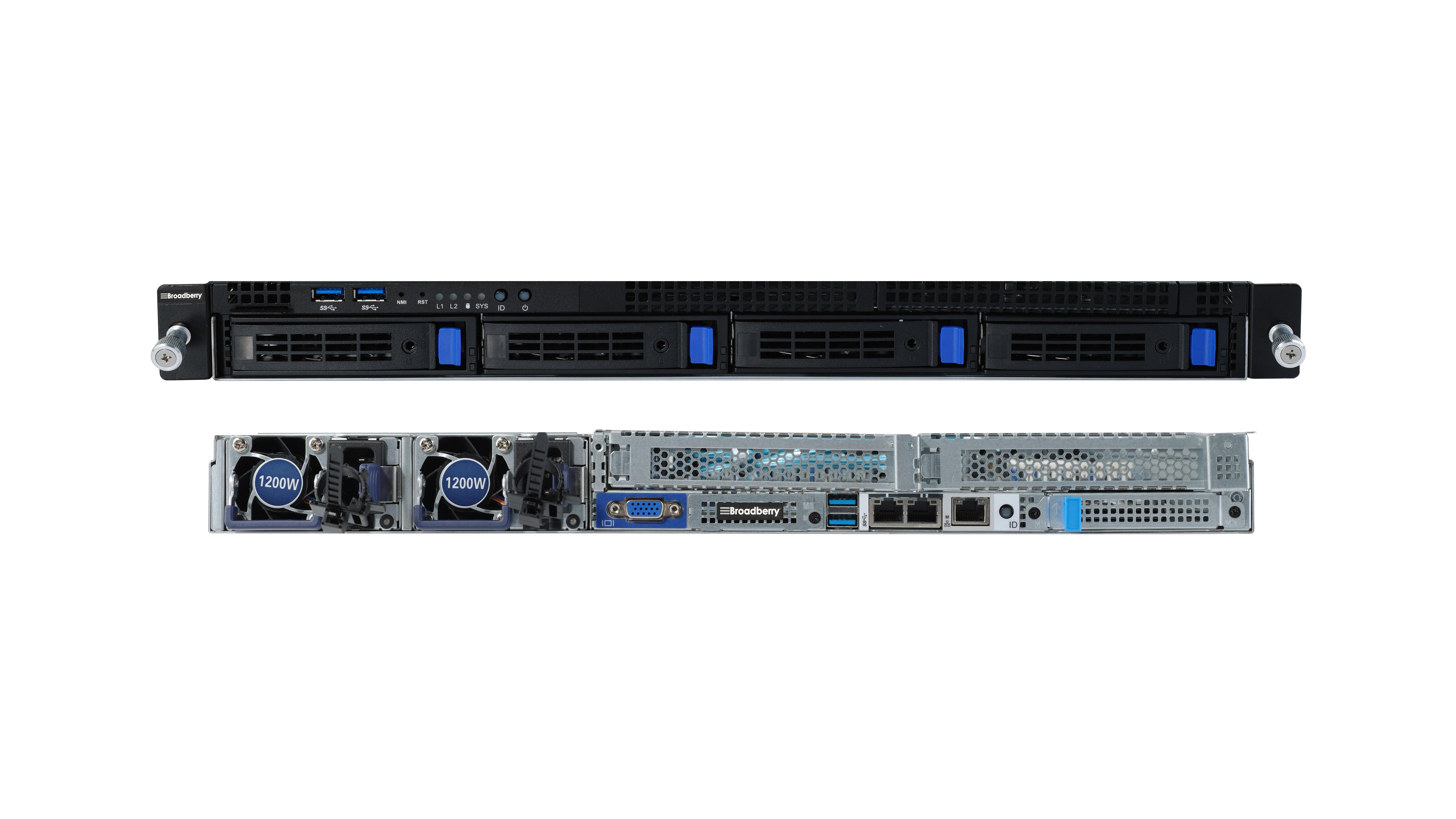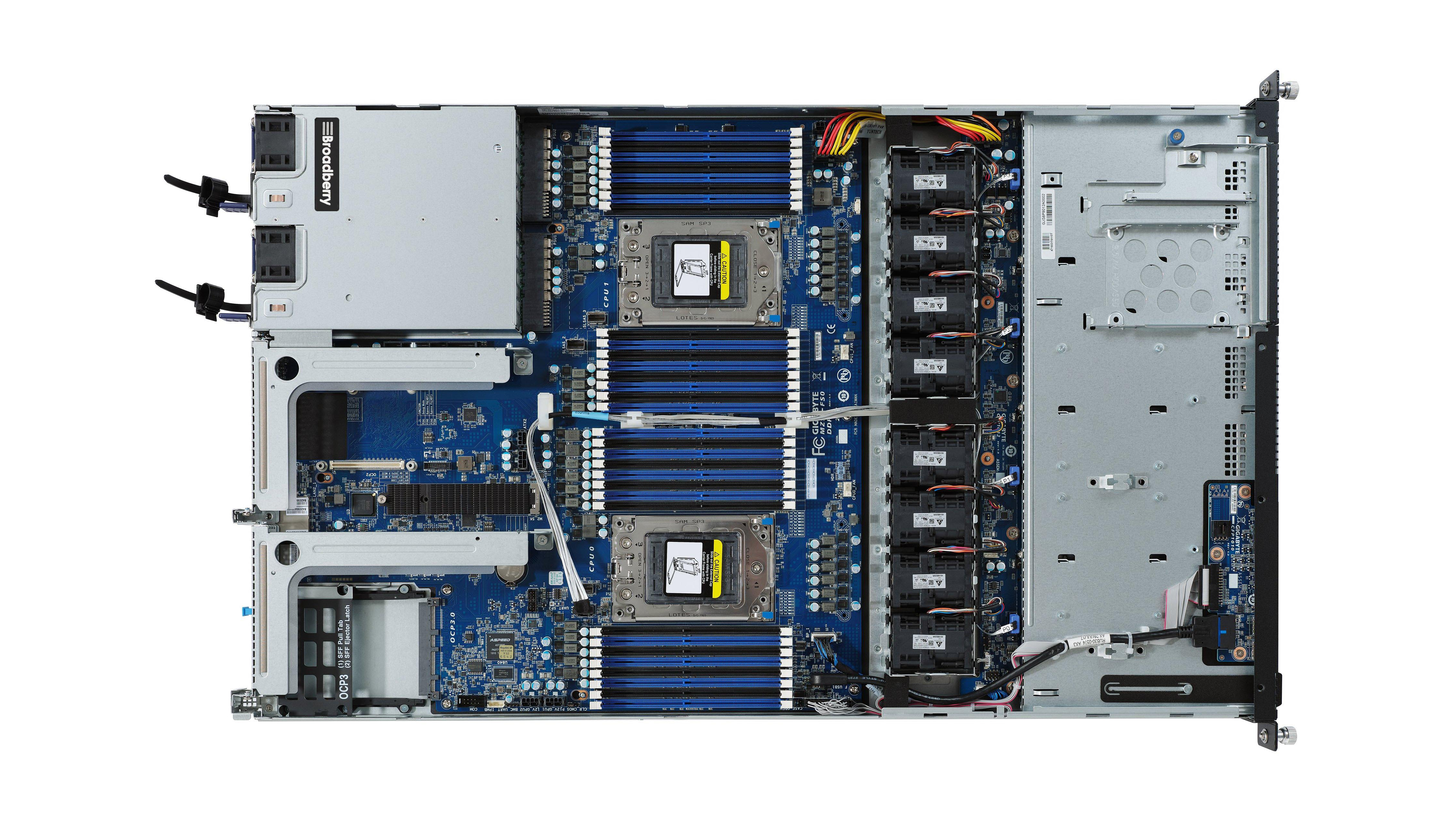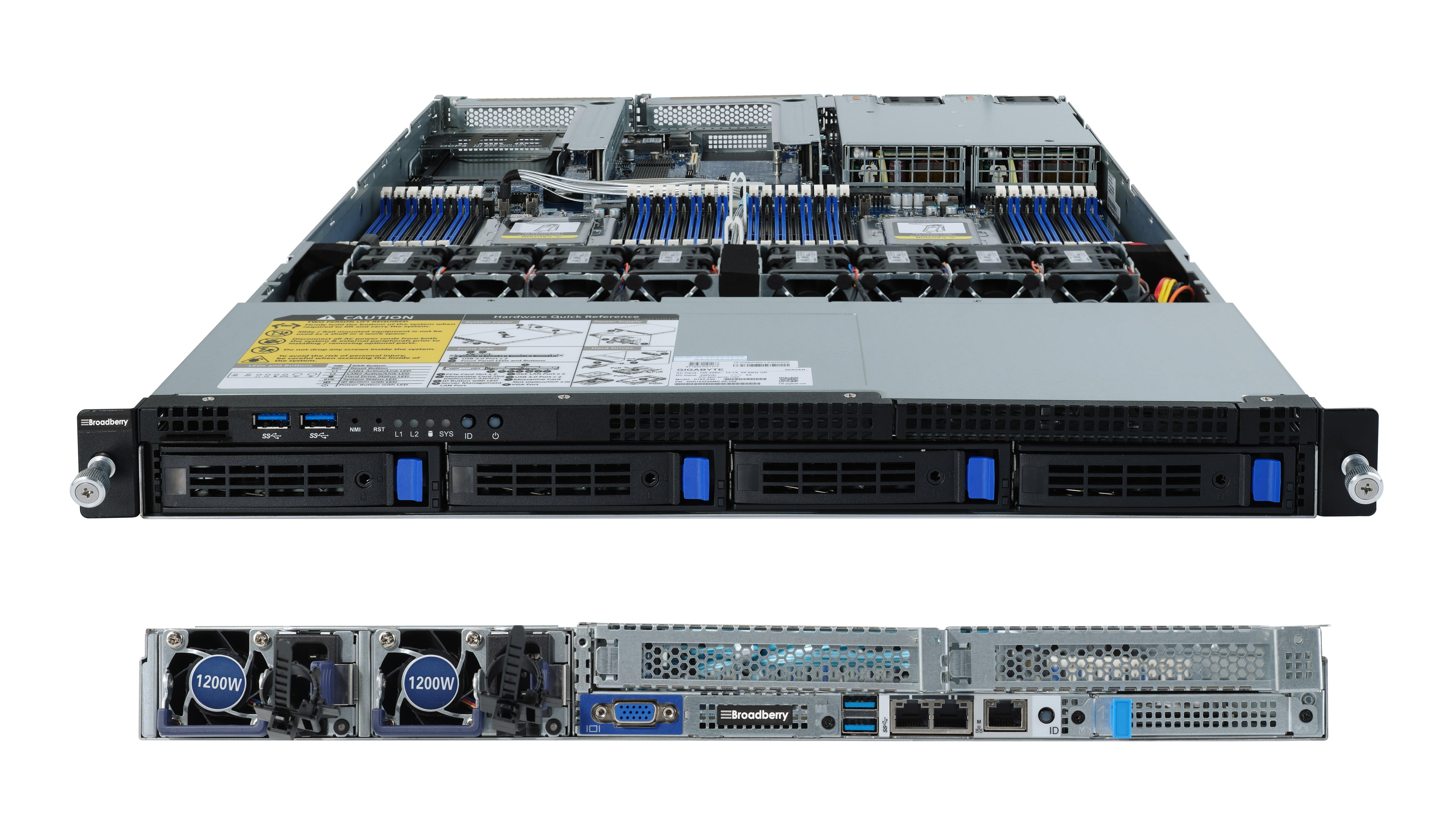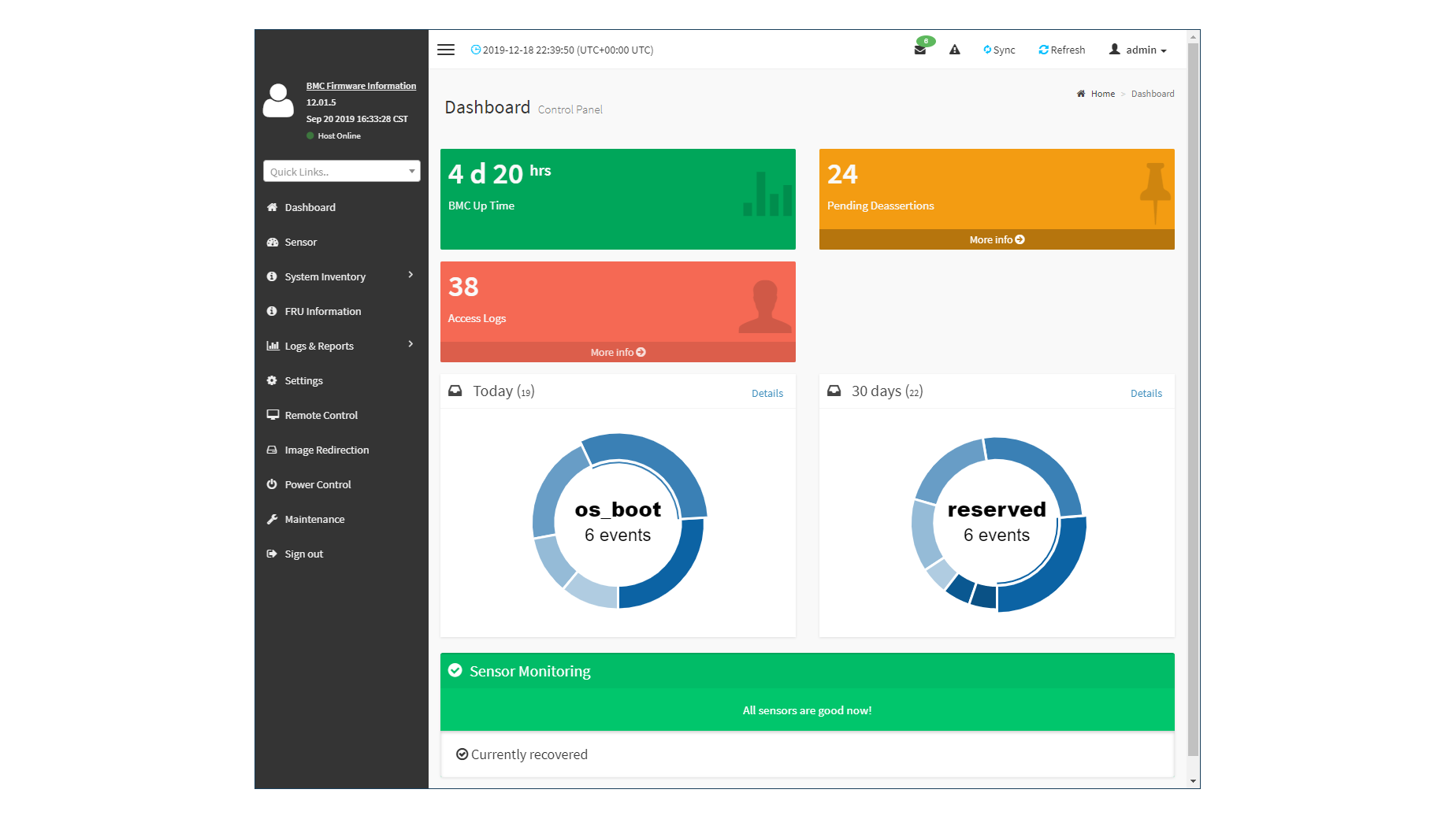Broadberry CyberServe R182-Z90 review: Gigabyte’s EPYC gamble pays off handsomely
A core-heavy EPYC 7002 server at an unbelievably good price


-
+
Fantastic value
-
-
RAID is optional

Server manufacturer Gigabyte made a calculated move when AMD launched its second generation of core-dense EPYC CPUs. While the blue-chips chickened out and waited to see what demand would be, Gigabyte went full steam ahead and produced no less than 28 EPYC 7002 rack server solutions – more than four times the rest put together.
Gigabyte’s range is really quite remarkable: you can choose from 1U, 2U and 4U rack chassis with single or dual CPU sockets, plus 2U quad node hyper-converged systems. Memory choices range from eight to 32 DIMM slots, all supporting eight-channel DDR4, while there’s just about as many storage options as you can think of.
On review we have Broadberry’s CyberServe R182-Z90 which showcases Gigabyte’s 1U 2P rack platform and delivers a hardware package that defies belief. The price we’ve shown includes a pair of mighty 32-core 2.9GHz AMD EPYC 7542 CPUs teamed up with a generous 128GB of super-fast 3,200MHz DDR4 ECC memory.
With 64 physical cores up for grabs, enterprises that don’t want 4P or 8P platforms won’t find a better value solution this this - a single 28-core Xeon Scalable Platinum 8280 CPU alone will cost you more than this entire server. And of course, while Intel snoozed, AMD went ahead and produced the world’s first 7nm CPU.
Broadberry CyberServe R182-Z90 review: Build and design
The CyberServe chassis is very well constructed and removing the lid reveals a smartly designed interior affording easy access for upgrades and maintenance. The dual EPYC 7002 sockets are located towards the front of the motherboard and flanked on each side by a total of 32 DIMM slots, allowing memory to be boosted to a massive 4TB.

Expansion options are very good for a 1U chassis; the server offers two PCIe Gen4 x16 slots on risers both with room for full-height, half-length adapter cards. The extra bandwidth of these Gen4 slots means the server can support the latest high-speed 50GbE and 100GbE network adapters.
Of equal interest are the two OCP (Open Compute Project) slots at the rear. Along with an OCP 2.0 Gen3 slot, the server has an OCP 3.0 Gen4 version and its tool-free design allows industry-standard mezzanine cards to be easily slotted in from the rear without needing to open the server’s lid.
Sign up today and you will receive a free copy of our Future Focus 2025 report - the leading guidance on AI, cybersecurity and other IT challenges as per 700+ senior executives
All of Gigabyte’s servers support every EPYC 7002 CPU including the 48 and 64 core models. Furthermore, they are certified to support a cTDP (configurable TDP) of up to 240W which offers a potential performance boost and can be manually set from the server’s BIOS.
Broadberry CyberServe R182-Z90 review: Storage features
The CyberServe comes with four hot-swap LFF/SFF drive bays across the front. No drives are included but the server comes with Gigabyte’s nifty tool-free drive carriers as standard and Broadberry allows you to install your own choice of drives without invalidating its warranty.
Two on-board four-port SATA connectors are provided but the motherboard doesn’t have any embedded RAID, so you’ll need to source an extra controller. Broadberry offers a good range of hardware RAID adapters, with the MegaRAID 9341-4i option delivering all the usual RAID suspects plus SAS3/SATA device support for the princely sum of £200.

The motherboard also has a single M.2 NVMe slot and the price includes a 1TB Intel 660p NVMe SSD card. This is a useful feature as you can run your OS or hypervisor from it and reserve all four front bays for data storage duties.
More storage choices are on the table for Gigabyte’s 1U systems. For example, the CyberServe R182-Z91 model comes with eight hot-swap SFF and two NVMe SSD bays. Businesses that want maximum storage performance may prefer the R182-Z92 version which sports a full complement of ten hot-swap U.2 NVMe bays.
Broadberry CyberServe R182-Z90 review: Power, cooling and management
The system was supplied with a meaty pair of 1200W hot-plug redundant power supplies and AMD scores another win over Intel thanks to the EPYC’s low power demands. The EPYC 7542 CPUs may have a high 225W TDP but we recorded the system drawing 110W in idle and peaking at only 446W with all 128 logical cores under maximum load – a 1U rack server in the lab with dual 28-core 2.7GHz Platinum 8280 CPUs peaked at a much higher 672W.
Cooling is handled efficiently by a bank of eight cold-swap, dual-rotor fans behind the drive backplane. Operational noise is noticeable but not excessive for such a powerful system, and we measured sound levels of just 61dB from one metre in front of the server.
Gigabyte has improved its remote management offerings with the embedded AST2500 IPMI controller presenting a freshly designed web interface packed with valuable information. Its new dashboard keeps you posted on all critical issues and you can dive deeper to view hardware sensors, link their thresholds to email alerts, control power and run full OS remote control plus virtual media services.

Gigabyte’s Server Management (GSM) utility offers a web console that provides a status and power dashboard for remotely monitored systems along with views of installed hardware and sensors, fan speed graphs and tools for remote firmware upgrades. Free mobile apps are also available and we used the iOS version on our iPad to link to the central GSM server and view graphs on system availability and health.
Broadberry CyberServe R182-Z90 review: Verdict
With the blue chips offering such a meagre selection of AMD EPYC 7002 rack servers, Gigabyte is clearly the place to go if you want a powerful system that precisely matches your workload and budget. Broadberry’s CyberServe R182-Z90 teams up a truly remarkable hardware package with a huge core density and is ideal for SMBs and enterprises that want maximum processing density in their racks at a price that core-dense Intel Xeon Scalable systems can’t hope to compete with.
Broadberry CyberServe R182-Z90 specifications
| Chassis | 1U |
| CPU | 2 x 32-core 2.9GHz AMD EPYC 7542 |
| Memory | 128GB 3,200MHz DDR4 ECC (max 4TB) |
| Storage bays | 4 x LFF/SFF hot-swap drive bays, OCP 3.0 Gen4 x16/OCP 2.0 Gen3 x8 mezzanine slots/ 1 x M.2 NVMe |
| Storage included | 1TB Intel SSD 660p M.2 NVMe |
| PSU | 2 x 1200W hot-plug PSUs |
| RAID support | Optional HBA |
| Network | 2 x Gigabit |
| Other ports | 2 x PCIe Gen4 x16 slots |
| Management | Aspeed AST2500 RMC with Gigabit, Gigabyte Server Manager |
| Warranty | 3yrs advanced replacement (3yrs on-site NBD - £1,185 exc VAT) |
Dave is an IT consultant and freelance journalist specialising in hands-on reviews of computer networking products covering all market sectors from small businesses to enterprises. Founder of Binary Testing Ltd – the UK’s premier independent network testing laboratory - Dave has over 45 years of experience in the IT industry.
Dave has produced many thousands of in-depth business networking product reviews from his lab which have been reproduced globally. Writing for ITPro and its sister title, PC Pro, he covers all areas of business IT infrastructure, including servers, storage, network security, data protection, cloud, infrastructure and services.
-
 Snowflake and OpenAI are teaming up to help enterprises capitalize on their "most valuable asset"
Snowflake and OpenAI are teaming up to help enterprises capitalize on their "most valuable asset"News OpenAI models and tools will now be embedded within the Snowflake Intelligence and Cortex platforms
By Ross Kelly Published
-
 What security teams need to know about the NSA's new zero trust guidelines
What security teams need to know about the NSA's new zero trust guidelinesNews The new guidelines aim to move an organization from discovery to target-level implementation of zero trust practices
By Emma Woollacott Published
-
 Amazon’s rumored OpenAI investment points to a “lack of confidence” in Nova model range
Amazon’s rumored OpenAI investment points to a “lack of confidence” in Nova model rangeNews The hyperscaler is among a number of firms targeting investment in the company
By Ross Kelly Published
